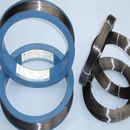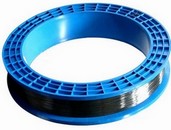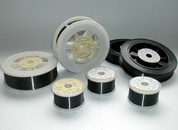Tungsten wire



Tungsten wire introduction
1, Diameter: 0.01mm~2.00mm
2, Grade: W1, W2, WAL1, WAL2, WAL3
3, Density: Purity 99.92%, 99.98% can also be achieved if special demanded.
4, Quality standard: GB/T 4181-1997(tungsten wire)ASTM B760-86
5, Specific electrical: 0.055 Ohm x mm2/m resistance at 20 °C.
6, Modulus of elasticity: 410 kN/mm2, at 20 °C.
Tungsten is the most widely used of the refractory metals. In wire form, it is essential for the production of lighting products such as wire filament, and other goods where its high temperature properties are of use. Among its properties are a melting point of 3410° C, a low coefficient of thermal expansion and low vapor pressure at elevated temperatures, along with good electrical and thermal conductivity.
Important applications of this metal wire are for the production of coiled incandescent lamp filaments, cathode and support structures for power tubes, heating elements for high temperature furnaces and evaporation sources in metallizing processes. Thicker wire sizes, straightened, finish-ground and cut into rod pieces are widely used for glass-to-metal seal lead parts in the lighting and electronic industries.
Dimensions and Tolerances of tungsten wire
Tungsten wires diameters are generally expressed in terms of inches or mils (thousandths of an inch). For thin wires from .001 inches up to .020 inches in diameter, the diameter of the wire is measured by weight per unit length. That is, the weight expressed in mg of a 200 mm length of wire.
The standard diameter tolerance is ± 3% of the weight measurement. Closer tolerances are available, depending upon the application for the wire product.
Straightness of tungsten wire
Wire may be finished in the unstraightened or as drawn condition and is controlled to 's internal standards, In addition, wire can be straightened via mechanical or heat treating processes. Typically, the measure of the straightness of a tungsten wire is obtained by cutting a ten inch long piece of wire and allowing it to lie on a flat clean surface. The maximum deviation from a straight line along its length is the quantitative measure of its straightness. In general, as the degree of straightness increases, tensile strength decreases.
Quality and Finish
Wire is free of scratches, kinks and distortions insofar as they are harmful to the intended end use of the product. Surface finish is supplied in the black, as drawn condition, where drawing lubricants and oxides are retained on the surface, or in the cleaned condition by firing in hydrogen or electrochemical etching.
Spooling
Wire is spooled on clean, defect free spools. For very large diameters, tungsten wire is self coiled. Spools are level filled without piling near flanges. The outer end of the wire is properly marked and attached securely to the spool or self coil.
|
Type |
Purity of tungsten |
Application |
|
WAl1 |
≥99.92 |
Double – screwy filament. Filament for high colour temperature lamp and shockproof lamp etc. |
|
Filament for incandescent lamp. Cathode for emitting tube. High temperature electrodes. Twisted tungsten wire etc. |
||
|
Folded – heater for electronic tube, etc. |
||
|
WAl2 |
≥99.92 |
Filament for fluorescent lamp etc. |
|
Heater for electronic tube. Filament for incandescent lamp. Twisted tungsten wire etc. |
||
|
Folded – heater for electronic tube, etc. |
||
|
WAl3 |
≥99.92 |
Filament for normal lamp. Spring wire for semiconductors, etc. |
|
W1 |
≥99.95 |
Tungsten wire in twisted and heating parts etc. |
|
W2 |
≥99.92 |
Grid side rod for electron tube. Tungsten wire in twisted etc. |
Tensile Strength and Straightness
Because customer process and equipment are widely differentiated, produces wire products to its own internal standards for tensile strength and straightness. These properties can be varied to meet specific customer needs and specifications.
Related Links
Tungsten Heater
Material Safety Data Sheet of Pure Tungsten
Material Safety Data Sheet of Pure Tungsten (PDF)
Catalog of Pure Tungsten Products (PDF)















